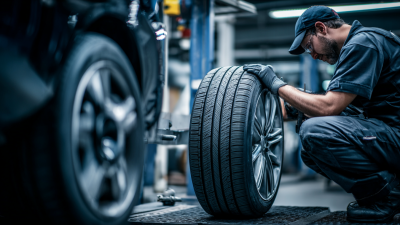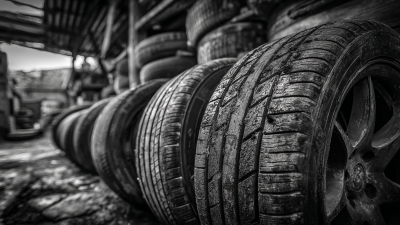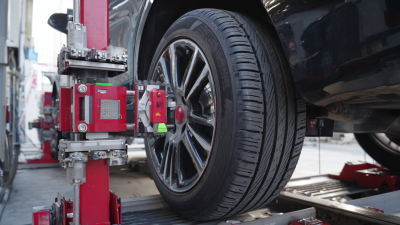Exploring the Impact of Tire Technology on Auto Performance and Safety in 2023
 The advancement of tire technology plays a pivotal role in enhancing auto performance and safety. In 2023, the global tire market is projected to reach approximately $300 billion, reflecting a growing emphasis on innovation in tire design and materials. According to the Tire Industry Association, up to 80% of a vehicle's performance is influenced by its tires, underscoring their critical importance in both everyday driving and high-performance scenarios.
The advancement of tire technology plays a pivotal role in enhancing auto performance and safety. In 2023, the global tire market is projected to reach approximately $300 billion, reflecting a growing emphasis on innovation in tire design and materials. According to the Tire Industry Association, up to 80% of a vehicle's performance is influenced by its tires, underscoring their critical importance in both everyday driving and high-performance scenarios.
Recent studies indicate that improved tire technology not only increases traction and fuel efficiency but also significantly reduces stopping distances in wet conditions. Moreover, with the rise of electric vehicles, the demand for specialized tire solutions that optimize range and durability has surged. This exploration of tire auto technologies reveals that as manufacturers respond to consumer safety demands and environmental concerns, the evolution of tires will continue to shape the future of automotive performance and safety standards.
The Evolution of Tire Materials: Enhancements in Grip and Durability for 2023
In 2023, advancements in tire technology have significantly reshaped automotive performance and safety. The evolution of tire materials has become a focal point, with manufacturers leveraging new compounds that enhance grip and durability. For instance, many modern tires now integrate advanced polymer formulations, which not only improve traction in wet and dry conditions but also extend the lifespan of the tire. The commitment to innovation in tire design ensures that drivers can expect more consistent performance, particularly in high-stress scenarios such as off-roading or racing conditions.
Tips: To maximize tire performance, always check air pressure regularly, as improper inflation can lead to decreased fuel efficiency and increased wear. Additionally, consider investing in higher-performance tires that cater specifically to your driving needs—whether that be off-road capability or high-speed stability.
The significance of tire quality is further underscored by studies indicating that upgrading from original equipment tires to premium options can enhance handling by up to 20%. As vehicles continue to evolve, having the right tires improves not only driving experience but also contributes to overall vehicle safety. The right compound blends, such as silica-enriched materials, are key to achieving lower rolling resistance and improved grip, ensuring that drivers are equipped for any driving condition.
Assessing the Role of Tire Pressure Monitoring Systems (TPMS) in Enhancing Safety Standards
The integration of advanced Tire Pressure Monitoring Systems (TPMS) is reshaping the landscape of automotive safety in 2023. These systems not only provide real-time data on tire pressure but also enhance vehicle performance by minimizing the risk of tire-related accidents. Recent innovations highlight the growing importance of TPMS in fleet management, ensuring compliance and safety standards are met. For instance, the collaboration between tire manufacturers and fleet service providers is facilitating seamless data sharing, which is crucial for maintaining optimal tire conditions under varying operational demands.
Tips: Regularly check your TPMS and ensure it is functioning correctly to avoid potential accidents caused by incorrect tire pressure. Keeping your tires properly inflated can also improve fuel efficiency, saving on operational costs.
Moreover, the advancement in AI technology for tire pressure measurement signifies a step forward in enhancing operational efficiency. As the TPMS market is projected to grow significantly in the upcoming years, it's vital for fleet operators to embrace these innovations. A well-maintained TPMS can significantly extend tire life and enhance overall vehicle safety, making it an essential component in modern automotive technology.
Tips: Invest in compatible tire pressure monitoring systems for your vehicles to leverage the benefits of real-time monitoring and alerts, ensuring proactive maintenance of your fleet.

Advanced Tire Technologies: Analyzing the Effects on Fuel Efficiency and Auto Performance
In 2023, advanced tire technologies have become pivotal in enhancing fuel efficiency and improving overall auto performance. The integration of innovative materials, such as eco-friendly compounds and advanced polymers, has allowed manufacturers to produce tires that not only reduce rolling resistance but also enhance grip and durability.
These advancements contribute to a smoother driving experience while maintaining safety standards, leading to lower fuel consumption and extended vehicle range.
Moreover, the implementation of
smart tire technology has revolutionized the way drivers interact with their vehicles. Equipped with sensors, these tires monitor pressure, temperature, and tread wear in real-time, providing crucial data that can help prevent accidents and optimize performance. As a result, drivers can make informed decisions about maintenance and tire replacement, ultimately leading to safer driving conditions and improved vehicle efficiency.
The synergy between cutting-edge tire technologies and automotive performance in 2023 underscores the essential role that tires play in modern vehicle engineering.
The Impact of Run-Flat Tires on Vehicle Safety and Driver Confidence in 2023
The automotive industry has seen significant advancements in tire technology, especially with the rising popularity of run-flat tires. These innovative tires allow drivers to continue their journey despite a puncture, typically for up to 50 miles at speeds of 50 mph. According to a report by the Tire Industry Association, approximately 25% of new vehicles sold in 2023 are now equipped with run-flat tires, highlighting their growing importance in enhancing vehicle safety.

Run-flat tires increase driver confidence by reducing the risks associated with tire blowouts. A study by the National Highway Traffic Safety Administration indicates that the use of run-flat tires can lower the likelihood of accidents caused by tire failures by approximately 30%. This is particularly important for long-distance travelers and urban commuters who may find themselves in remote areas where roadside assistance is not readily available. As a result, drivers can feel more secure knowing that they can maintain control and mobility even after a tire issue arises.
Moreover, the integration of run-flat tires contributes to overall vehicle performance by allowing for more compact spare tire designs, which can lead to increased cargo space and improved fuel efficiency. With the ongoing advancements in tire materials and designs, the future looks promising for both vehicle safety and driver reassurance, making run-flat tires a smart choice for modern automobiles.
Sustainability in Tire Production: How Eco-Friendly Innovations Are Shaping the Auto Industry
In 2023, the auto industry is witnessing a significant shift towards sustainability, particularly in tire production. The increasing awareness of environmental issues has led manufacturers to adopt eco-friendly innovations that not only reduce the carbon footprint but also enhance vehicle performance and safety. From the use of sustainable materials like bio-based rubber and recycled components to implementing energy-efficient manufacturing processes, tire companies are paving the way for a greener future.
These advancements in tire technology are not just beneficial for the planet; they also contribute to better driving experiences. Eco-friendly tires often feature improved tread designs that minimize rolling resistance, leading to enhanced fuel efficiency. Additionally, these innovations can improve grip and durability, which directly correlates to increased safety on the road. As the auto industry continues to embrace sustainability, the integration of environmentally mindful practices in tire production will play a crucial role in shaping the future of transportation, aligning performance with ecological responsibility.
Exploring the Impact of Tire Technology on Auto Performance and Safety in 2023
| Innovation Type | Description | Impact on Performance | Impact on Safety | Sustainability Factor |
|---|---|---|---|---|
| Eco-Friendly Materials | Use of renewable resources like natural rubber and recycled materials in tire production. | Improves grip and handling abilities. | Reduces the risk of tire blowouts. | High - Significant reduction in carbon footprint. |
| Smart Tire Technology | Incorporation of sensors that monitor tire pressure, temperature, and tread wear in real-time. | Enhances fuel efficiency and extends tire lifespan. | Provides advanced warnings to prevent accidents. | Medium - Drives the need for eco-efficient materials. |
| Low Rolling Resistance Tires | Designed to minimize the energy loss as tires roll, improving fuel economy. | Increases vehicle range and efficiency. | Provides stable control on wet roads. | High - Reduces overall fuel consumption and emissions. |
| Self-Healing Tires | Incorporate materials that can repair themselves from minor punctures. | Extends the life of the tire and improves overall performance. | Dramatically reduces the risk of unexpected tire failure. | Medium - Less waste produced from discarded tires. |
| Tread Pattern Innovations | Advanced tread designs that enhance traction and control on various surface types. | Significantly improves handling, especially in adverse conditions. | Increases safety, especially in wet or icy conditions. | Low - Primarily focuses on performance improvements. |
Related Posts
-

Essential Tips for Choosing the Best Tire Repair Shop Near You
-

The Ultimate Guide to DIY Car Tyre Repair Techniques for Every Driver
-

Understanding Tire Alignment Cost: What Affects Pricing and Why It Matters for Your Safety
-

The Ultimate Guide to Choosing the Perfect Car Tyres for Every Season
-

Discover the Best Local Tire Shops for Your Vehicle Needs Near You
-

The Real Factors Influencing Tire Alignment Cost: What Every Car Owner Should Know